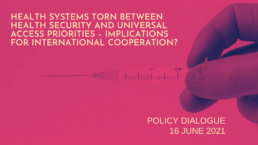MMI Policy Dialogue
The Covid-19 pandemic has exposed weaknesses in the performance of essential public health functions and deepened the cracks in primary health care and equitable and universal access to health. It has stretched health systems to their limits creating many times a collapse in the delivery of population and personal health services. It has also shown that countries are not fit for pandemic preparedness and response. Health systems seem to be more developed towards case treatment than to early warning systems and outbreak management. But the rapid shift of priorities towards Covid-19 responses had itself a negative impact on the regular activities of health systems, from ongoing childhood vaccination rates and access to clinics for safe mother and child care to delays in diagnostic procedures, surgical interventions and provision of primary health services and hospital based services. The chronic shortage of health staff and chronically underfunded health institutions has not allowed to absorb new tasks in healthcare at short notice. In addition, the international mechanisms for a response to the pandemic have negatively affected the north-south cooperation and dialogue on mutual expectations.
What are the implications for setting priorities in international health cooperation in this new reality after the start of the pandemic? How to deal with this complexity beyond the slogans of “health security” and “universal health care”? What is in the best interest of healthcare for all?
In this session of the MMI policy dialogues 2021, public health experts, practitioners and activists from different regions of the world, and with a diverse institutional background, shared their experiences and expectations on the following set of questions: How has the pandemic hit your health system? Has it changed your perception of public health priorities? Has it shown neglected elements of the healthcare system? How has the pandemic changed interaction between civil society, national health authorities, and international partners? What implications for international health cooperation and solidarity? Changing paradigms? transformative policies?
Session documentation
Session overview
- Recording: Zoom cloud
- Programme: Google doc
- Moderation slides: PPT as PDF

Speakers and presentations/input
- Aquina Thulare, Ministry of Health, National Health Insurance, South Africa
Presentation: PPT as PDF - Arachu Castro, Tulane Public School Latin America, USA
- Christina de Vries, Cordaid, The Netherlands
- Daniel Lopez Acuna, Andalusian School of Public Health (EASP), Spain
Input: PPT as PDF - Dieter Müller, medico international, Germany
- Eliza Sthapit, Cordaid and ICCO, Nepal
- Eubert Voshoma, Cordaid Liberia
- Khuat Thi Hai Oanh, SCDI, Vietnam
- Mariëlle Bemelmans, Wemos
Input: PPT as PDF - Pia Vracko, National Institute of Public Health, Slovenia
- Richard Gregory, UHC2030, Switzerland
- Sulakshana Nandi, People’s Health Movement, India
- Thomas Schwarz, MMI Network, Switzerland
Documentation to be completed
…and watch the session recording!
Session contacts
- Christina de Vries, Cordaid (session co-lead)
- Daniel Lopez Acuna, EASP (session co-lead)
- Thomas Schwarz, MMI Executive Secretary (support)

Session co-organizers
14-17 June 2021: MMI Policy Dialogues 2021
Monday, 14 June 2021, 14-16 hrs CEST
Business? As usual? Looking into the political economy
of digital health and international cooperation
Tuesday, 15 June 2021, 14-16 hrs CEST
Promote civic space at the WHO and other UN bodies and agencies
…and defend democratic multilateralism
Wednesday, 16 June 2021, 14.30-16.30 hrs CEST
Health systems torn between health security and universal access priorities
– implications for international cooperation?
Thursday, 17 June 2021, 14-16 hrs CEST
Health and climate justice: Transformative cooperation and healthcare practice
Overview: here
